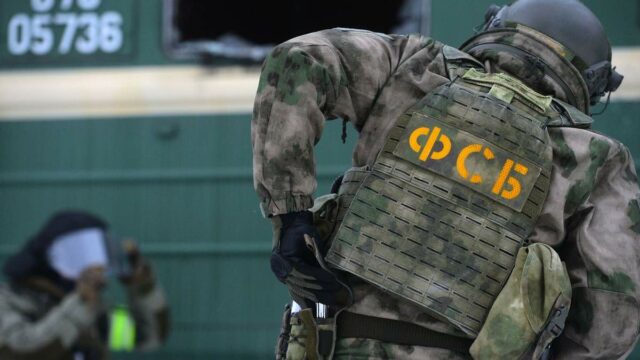Ksenia Kirillova

Recent months have shown that Ukraine has had ever-more success with sabotage and partisan operations in the enemy’s rear (see EDM, May 16). Not only Russian propagandists but also security experts admit that they are unable to cope with the new threats and lack the capability to prevent them. At a time when religious leaders are calling for maximum mobilization for victory and for a rejection of the Internet because it is “enemy territory” and an instrument for the recruitment of Russians (YouTube, May 14), military leaders want to re-create SMERSH, the repressive Soviet counterintelligence organization.
SMERSH can be translated as “death to spies” and was created under the NKVD (People’s Commissariat for Internal Affairs) during World War II. Today, authors of the Military Review website, which is close to the Russian Ministry of Defense, suggest resurrecting something similar to check not only potential dissidents but also people returning from abroad, among whom, in the opinion of the authors, are many “recruited and trained saboteurs” (Topwar.ru, May 14). Besides this, the Russian military suggests using the new SMERSH for the filtration of people into the occupied territories of Ukraine.
In this regard, they do not recommend the creation of a new structure, but rather the expansion of the powers of those already in existence, for example SOBR (Special Rapid Response Unit) Spetsnaz as part of the Ministry of Internal Affairs, as well as the counterintelligence and intelligence activities of the Russian Federal Security Service (FSB), Ministry of Defense and National Guard (Rosgvardiya). All these entities, the authors say, should use “the methods of [Pavel] Sudoplatov,” that is “destroy saboteurs in enemy territory” (Topwar.ru, May 14).
In essence, much of what the military analysts propose already exists in practice. In particular, Russian special services researchers note that, since the beginning of the war, the FSB has become significantly militarized and is actively involved in the torture and interrogation of Ukrainians in filtration camps (Agentura.ru, February 28).
The Russian special services also have considerable experience in assassinations abroad; however, in the opinion of Ukrainian experts, more often than not, their victims are not opponents of the regime but rather operatives of competing agencies. For example, several observers link the liquidation of the former head of the so-called Donetsk “people’s republic,” Aleksandr Zakharchenko, in 2018 with the enmity between the FSB and the Main Intelligence Directorate of the Russian General Staff (GRU). They opine that Zakharchenko was involved with the military, which interfered with the FSB, and, therefore, he was killed (Tsn.ua, September 7, 2018). Conflict between Russian operatives in occupied Luhansk in 2017 was also associated with a confrontation between the special services in charge of them (Segodnya.ua, November 23, 2017).
Conflict between Russian intelligence services has also occurred outside Ukraine. Researchers note that a series of GRU failures in 2018 may have been the direct result of information leaks from the FSB (Riddle Russia, October 16, 2018). The Center for Investigation Management claims that exposure of the hacker group “Shaltai-Boltai” of the FSB was a revenge operation by the GRU (19rus.info, June 21, 2017). Against this backdrop, reports that the founder of the Wagner Group, Yevgeny Prigozhin, suggested providing Ukrainian intelligence with information on Russian military positions in exchange for the retreat of Ukrainian forces from Bakhmut no longer seems implausible (Current Time TV, May 15).
Some analysts note that the GRU is hardly the only organization in conflict with the FSB. They think the conflict between the special services and the Russian Federal Protective Service was the real reason for the creation of Rosgvardiya. The Chekists also have periodic conflicts of interest with the Ministry of Internal Affairs, Investigative Committee and Foreign Intelligence Service (Сarnegieendowment.org, July 26, 2017). The war, according to Ukrainian observers, has thus intensified the confrontation between the FSB and the military (Тelegraf.com.ua, September 7, 2022).
Importantly, Russian President Vladimir Putin permits confrontations between different agencies so they do not become too powerful. If in relation to this the already considerable powers of each agency to carry out repressions and murders abroad are expanded, it can be assumed that a significant part of such activity will involve reprisals against one another.
This situation is aggravated by the fact that, under wartime conditions, the Russian special services begin to fight among themselves not only through arrests or “targeted” killings but also through the creation of paramilitary forces that have weapons and military experience and over which they eventually lose control. A clear example of this is the never-ending battle between Prigozhin and the Russian Ministry of Defense (see EDM, May 17). The Wagner leader’s scandalous revelations and constant insults against the Russian military leadership are seen as “unprecedented” even by veterans of the Chechen wars (Рolitnavigator.net, May 16).
In truth, Wagner is hardly the only private military company in today’s Russia. According to information provided by The Insider, the GRU was involved in the establishment of Prigozhin’s group, but he then severed ties with the military. In response, the GRU created the new, more malleable paramilitary group “Redut” under the leadership of Anatoliy Karazia. Additionally, the GRU controls the “Potok” paramilitary group created under Gazprom (The Insider, May 15).
In the meantime, Russian oppositionists fairly note that the only way to protect their interests in modern Russia is to create their own private military group—and it is the same for state structures and private businesses. As combat experience is accumulated, the possibility increases that sooner or later these paramilitary groups and the security services behind them will begin to sort things out with weapons rather than with words, which may inevitably turn Russia into a “failed state” (see Failed State: A Guide to Russia’s Rupture, July 2022; YouTube, May 14). Logically, internecine wars between elite groups will do nothing to cope with Ukrainian sabotage and will only further destabilize Russia from within.
No comments:
Post a Comment